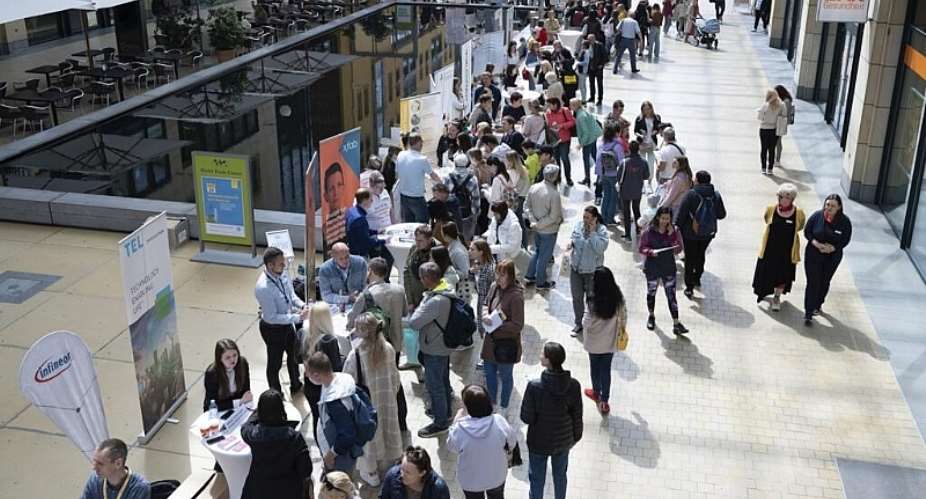Chancellor Olaf Scholz and the heads of Germany's 16 states have agreed on new measures to tackle soaring migration after crunch talks.
In the first four months of 2023, some 101,981 asylum applications were filed in Germany, an increase of 78 percent from the same period in 2022.
Almost 218,000 applications were filed in Germany last year, the highest number since 2015-16, with the largest number of newcomers hailing from war-torn Syria and Afghanistan, followed by Turkey and Iraq.
In addition, more than a million people arrived from Ukraine in the wake of Russia's invasion of the country.
IT systems
In Wednesday's agreement, a modernisation of IT systems is due to help accelerate the processing of asylum applications, which currently takes 26 months on average, potentially speeding up the expulsions of those with unsuccessful bids.
An extension of the maximum detention period for migrants from 10 to 28 days was agreed to make it easier to order and maintain their detention before a possible expulsion.
Germany will also aim to reach "new migrant partnerships" with the countries of origin of the new arrivals, Scholz told a press conference.
Scholz said the agreements would facilitate the arrival of "qualified staff" from the relevant nations in exchange for deals allowing the return of irregular migrants.
The federal government and the regions opted against implementing permanent border checks with neighbouring countries, but refused to rule it out.
Schengen Borders Code
Germany will apply the restrictions under the the Schengen Borders Code ( SBC ,) which provides EU member states with "the capability of temporarily reintroducing border control at the internal borders in the event of a serious threat to public policy or internal security."
Currently, according to the website of the European Commission , 13 of the 26 Schengen countries already have temporarily reintroduced border controls. Germany only applies fixed controls to everyone passing through along its border with Austria.
Those regulations were imposed by Germany, together with Denmark, Norway, Austria and Sweden for a period of five months, which ended on 11 May.
Then, Germany cited "strain on national refugee reception facilities, need to increase security of critical infrastructures" as a reason, but given the latest deal, these last measures seem to have fallen short of stemming the flow.
The new agreement also says that "to return persons who are obliged to leave the country to their countries of origin, it is necessary to improve cooperation with numerous countries of origin".
Scholz said "similar measures" would be taken with other neighbouring countries according to the situation.
Germany also borders Belgium, the Czech Republic, Denmark, France, Luxembourg, the Netherlands, Poland and Switzerland.
Long-term solution
The government also committed to giving a further €1 billion to the states, with a working group to examine a long-term solution.
Regional leaders have long been demanding more help and money to cope with the new arrivals, with many being forced to build temporary shelters.
"Controlling and limiting irregular migration" is a priority for Germany, Scholz said.
The recent influx of asylum seekers has coincided with a rise in support for the far-right AfD party, especially in ex-communist eastern Germany.
The anti-migrant party is currently polling at around 15 percent, compared with 10.3 percent in the last general election in 2021.
(with wires)





 Dumsor must stop vigil part 2: We’ll choose how we demonstrate and who to partne...
Dumsor must stop vigil part 2: We’ll choose how we demonstrate and who to partne...
 2024 elections: NDC stands on the side of morality, truth; NPP isn't an option —...
2024 elections: NDC stands on the side of morality, truth; NPP isn't an option —...
 Akufo-Addo has moved Ghana from 'Beyond Aid' to ‘Beyond Borrowing’ — Haruna Idri...
Akufo-Addo has moved Ghana from 'Beyond Aid' to ‘Beyond Borrowing’ — Haruna Idri...
 Train crash: NDC is full of evil mindset; driver who 'deliberately' parked the c...
Train crash: NDC is full of evil mindset; driver who 'deliberately' parked the c...
 Dumsor: Energy Minister must be fired; it’s becoming unbearable — IES
Dumsor: Energy Minister must be fired; it’s becoming unbearable — IES
 #DUMSORMUSTSTOP: IMANI responds to Yvonne Nelson's call for a joint vigil
#DUMSORMUSTSTOP: IMANI responds to Yvonne Nelson's call for a joint vigil
 'Obiara b3didi' — Manhyia South NPP Chairman fights for resourcing of NPP grassr...
'Obiara b3didi' — Manhyia South NPP Chairman fights for resourcing of NPP grassr...
 Dumsor: This thing is becoming unbecoming, collapsing our business — Nana Ofori ...
Dumsor: This thing is becoming unbecoming, collapsing our business — Nana Ofori ...
 Dumsor: It'll be no more by the end of April — Gideon Boako assure Ghanaians
Dumsor: It'll be no more by the end of April — Gideon Boako assure Ghanaians
 "I can now see clearly with my two eyes, thanks to the generosity of Afenyo-Mark...
"I can now see clearly with my two eyes, thanks to the generosity of Afenyo-Mark...
